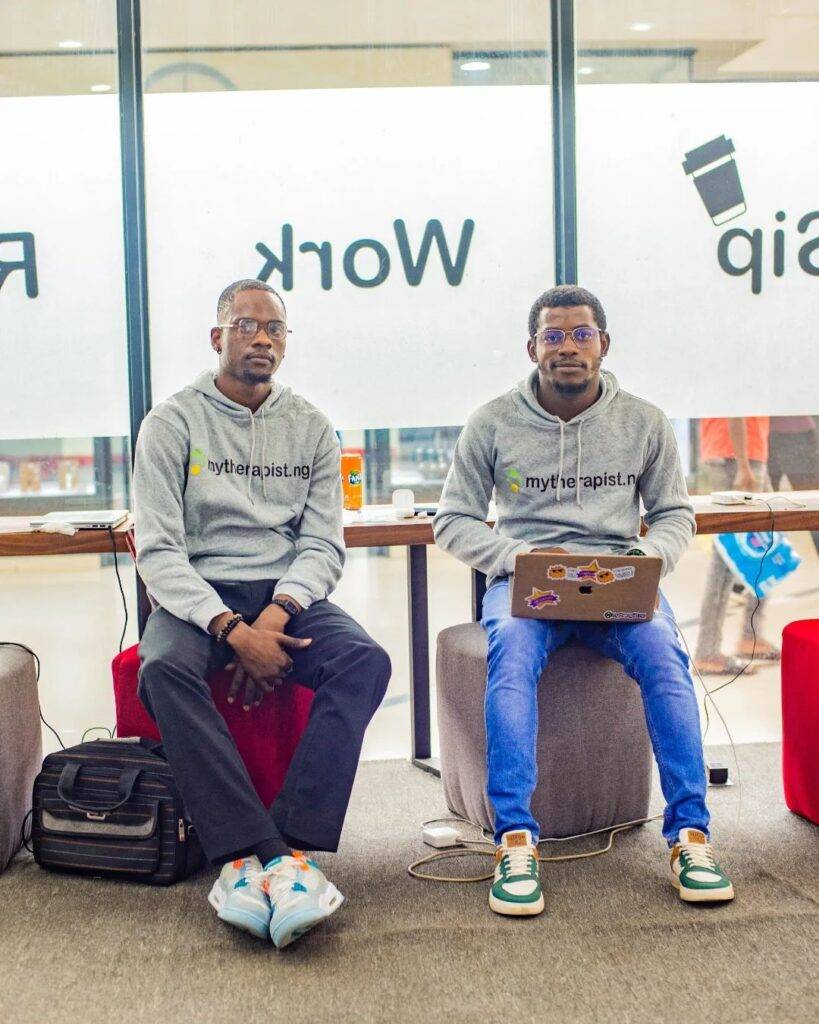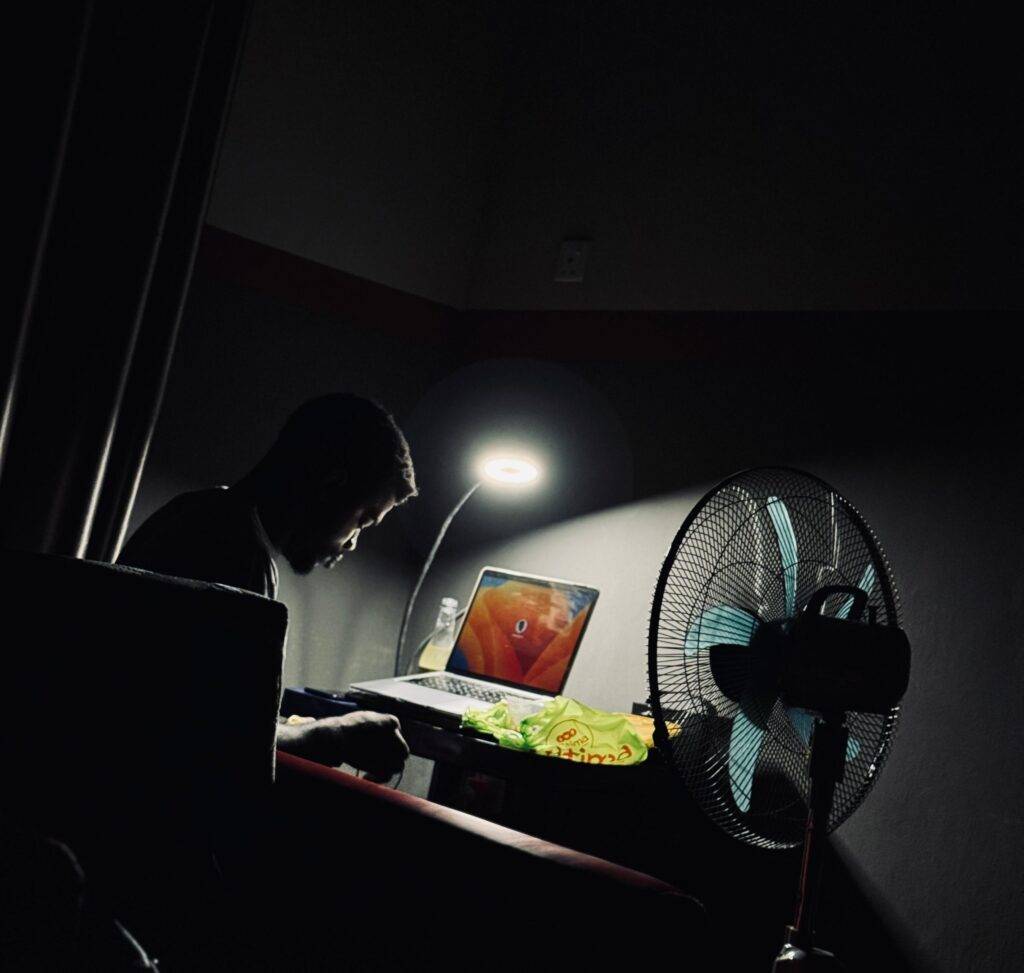Olawale Ilesanmi is a seasoned software engineer with an impressive 9-year journey in the tech space. His expertise has found a unique purpose at mytherapist.ng, where his passion for technology merges with the mission to enhance mental well-being.
I spoke with him about his work, his role at mytherapist.ng, and his thoughts about technology’s place in mental health.
Hello, Olawale! I’m thrilled to have you here. Before we jump into the nitty-gritty, please introduce yourself.
I’m Ilesanmi Olawale, a software engineer—a back-end engineer precisely. I’ve been in the software engineering world since 2015, and I joined mytherapist.ng in 2022. I’m also an academic; I study civil engineering.
Awesome. How did you join mytherapist.ng? And what’s your best part of working there?
I joined mytherapist.ng way before launch, so I was part of its first team. I watched Raphael (the cofounder) work on mytherapist.ng from a distance and admired his passion. I had no idea he’d invite me to join mytherapist.ng, but when he did, I accepted immediately. I was drawn in by his genuine desire to do good for people.
I love working at mytherapist.ng because of the positive atmosphere. When I joined in 2022, I was juggling work and school, and mytherapist.ng was the only environment that wasn’t toxic or frustrating, so it was a safe space for me. What really stands out to me is the team’s unity—everyone is always in sync—and the overall cool vibe. Since 2022, that energy hasn’t wavered.

From all the features you’ve worked on for mytherapist.ng, which is your favorite and why?
Selecting just one feature is tough, so I’ll name two.
The appointment feature is my favorite. I was able to help therapists manage their availability—they can choose days and times they’ll be on or off work. I also helped them avoid appointment collisions by integrating automatic Google events for each appointment on mytherapist.ng. Plus, I added in-app audio and video call options for clients. The appointment feature is the heart of the mytherapist.ng platform, and I take pride in the effort I put into it.
My second favorite feature is the affirmation feature. I love it because it’s a wonderful feeling to know that a feature I created can brighten someone’s day. Besides, whether you book a therapy session or not, everyone who signs up on mytherapist.ng has access to it.
I think it’s cool because you may be down, and the affirmation might be exactly what you need to feel better. Even though I built the feature, I enjoy its impact, too. At 7am every morning, I always look forward to seeing my affirmation.
Can you describe your typical workflow or development process when starting a new project?
When starting on a new project, my typical workflow involves first organising the database structure. Then, I conceptualise the feature; I usually summarise the code mentally before diving into the coding process. Sometimes, my final results are very different from my initial mental map.
Suggested read: Building bridges between tech and mental health: Insights from a software engineer
Once the code is complete, I conduct direct testing to make sure the feature functions properly. Then, I run manual and automated tests to ensure that the automated tests mimic the manual testing process. This helps me automatically detect future bugs and the impact features I add in the future will impact it.
After this, the front-end engineers test the integration. If I need to make any changes, I iterate through the same process—depending on the scale of changes needed. If I find any bug later, I resolve it and conduct tests to confirm that it’s completely resolved.
My approach is comprehensive and thorough.
Who are your role models or people who have significantly influenced your career path?
One notable person who has shaped my career path is Bruse Nbangwa, a Zambian software engineer. I’ve always wanted to reach his level of expertise—I don’t know if I have now, but he has inspired me to come this far.
I’m also inspired by people like Prosper Otemuyiwa and Taylor Otwell, the creator of Laravel. I study their processes closely, examine their code, and adopt their approaches, and these have significantly influenced my coding style and impacted my learning and growth as a software engineer.
In your experience, what are some common misconceptions people have about software engineers?
People usually say software engineers spend most of their money buying gadgets. I don’t think that’s awkward; it’s natural to want to buy tools for your work.
If you’re a fashion designer, you’d invest in quality sewing machines and tools. If you’re a mechanic, you’ll buy different kinds of tools for your work. So, I don’t think it’s different in any profession. It’s not that software engineers are obsessed with laptops or gadgets. It’s only natural to be attached to the instruments that help us do our job.
Another stereotype is that a typical software engineer is an introvert, but that’s not true. Software engineering is really demanding, so there’s little time to socialize. I’d really like to be invited to parties, though—I’ll attend when I can. Software engineers are not introverts by default; we just have our hands full most of the time and have little time for socializing.

In your opinion, what role can technology play in improving mental health awareness and treatment?
I think technology plays an important role in improving mental healthcare, and we’re actively doing that at mytherapist.ng—bridging the gap between you and qualified therapists for as low as 3k.
People usually have to wait months and travel far to see therapists at expensive rates. There’s also a lot of stigma attached to mental health. Through tech, mytherapist.ng has been solving these problems. You can access a therapist anytime you want in the comfort of your home at an affordable price. Mytherapist.ng’s blog also contains relevant information on various mental health related topics.
Suggested read: Wellness Champion Spotlight: 5 Mental Health Insights from an Interview with Dare Asobele
This is just the beginning. We’re still looking to leverage many initiatives to improve mental health through technology. So, yeah, technology plays a crucial and undeniable role in facilitating mental healthcare and awareness.
Software engineering is known for neck-breaking schedules. In this career, how do you maintain a healthy work-life balance?
To be honest, I don’t have a defined method to balance things. But these days, I’ve developed a method that involves consciously setting aside time for both work and rest. When I feel tired, I put everything down and rest. Before, I used to work through my tiredness, but now I take breaks when I need them.
I also avoid overnight work as much as possible to ensure I get quality night sleep. By working during the day, I prioritize resting at night, which helps me maintain a healthy work-life balance.
What do you think about the integration of artificial intelligence into mental health applications?
I believe mental health should get a reasonable level of intervention from artificial intelligence, but it should be approached with caution. I believe mental health should be as natural as possible, so AI’s role should be to support mental health professionals to enhance their services, not to be the service itself.
Looking ahead, what technological advancements in software development do you find most exciting or promising?
The technological advancements I find most exciting and promising are quantum computing and artificial intelligence.
Artificial intelligence has been growing for a long time compared to any other technology, and I’m excited about the new discoveries we’ll uncover in the future.
Conclusion
From his experiences and projects, it’s clear that Olawale’s passion, dedication, and thoughtful approach to development are the driving forces behind his success, leaving lasting impacts on his projects in the digital and mental health spaces.
Exploring the Four Attachment Styles: A Comprehensive Guide.
Next articleBeyond the hashtags: Managing social media for mental health with Britney Aseroma





